If you run a business, a farm, or a firm, you have to manage your finances using accounting software. Most people take care of finances by hiring an accountant or manage their finances using accounting software. There are several excellent open-source accounting software out there.
The article will explore free, reliable, and extendable open source accounting software that you can run in your Linux distribution.
You can use accounting software to collect accounting information, analyze, generate reports, automate recurring tasks, and govern your accounts. Any accounting software should handle most functions such as the general ledger, accounts receivables, accounts payable, bank reconciliations, and fixed assets. We will identify software that can handle such tasks plus others like billing, budgeting, invoicing, inventory management, payroll management, and project accounting.
Accounting Software for Linux
Accounting software is a must-have for individuals or small businesses who are striving to grow their businesses. It will help you process financial transactions in record time, generate accurate financial records, help you file taxes, and even help reduce administrative and accounting department costs.
1: GnuCash
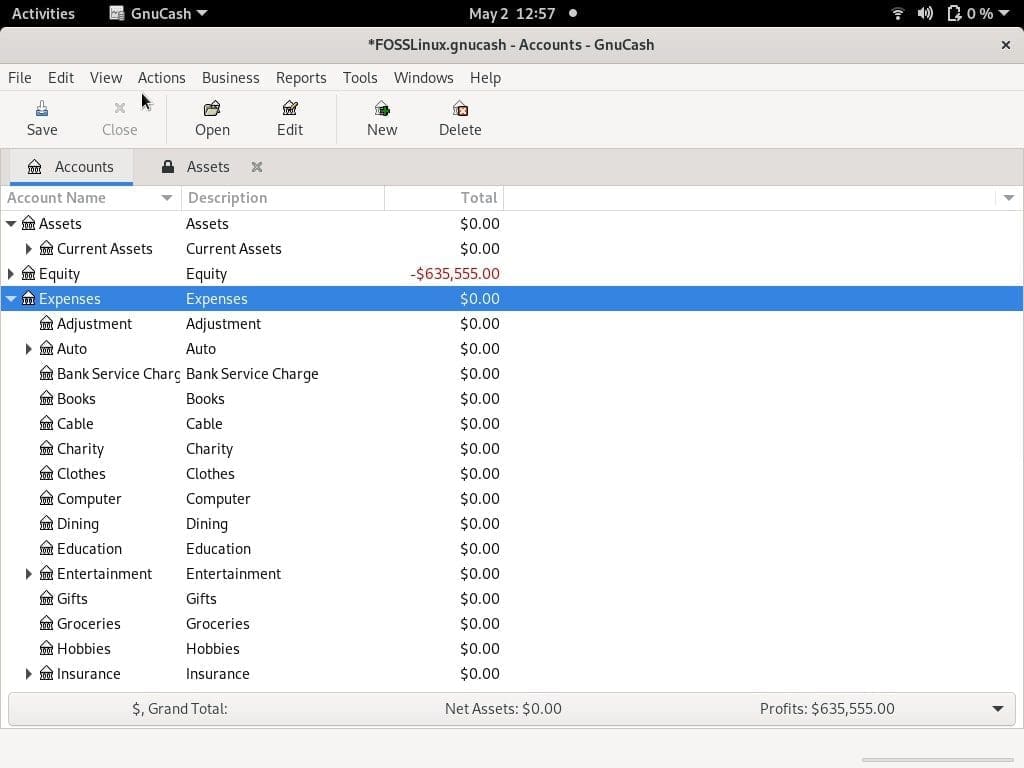
GnuCash Accounting
GnuCash is a simple, straightforward, flexible yet powerful open source accounting software for personal and small businesses. It is designed as a double-entry bookkeeping system and is freely available under the GNU GPL license. GnuCash has been under development for over 20 years and is available for Linux, GNU, OpenBSD, FreeBSD, Solaris, Windows, and macOS platforms.
Users can track bank accounts, income, expenses, stocks. Moreover, it is used as an intuitive checkbook register. It is built on professional accounting principles to ensure accurate reports. It supports features such as extensive accounting features, stock/mutual fund portfolios, online stock quotes, mutual fund quotes, QIF, OFX, CSV imports and supports multiple currencies.
Desirable features
- Double-Entry bookkeeping and accounting.
- Invoicing and credit notes.
- Support for scheduled financial transactions.
- Support for stock/bond/mutual fund accounts.
- Mapping to income tax schedules.
- Supports multi-currency transactions.
- Built-in and custom reports and charts.
- Basic Payroll Management
GnuCash simplifies small business accounting tasks like invoicing, managing income, expenses, billing, and taxes.
2: HomeBank
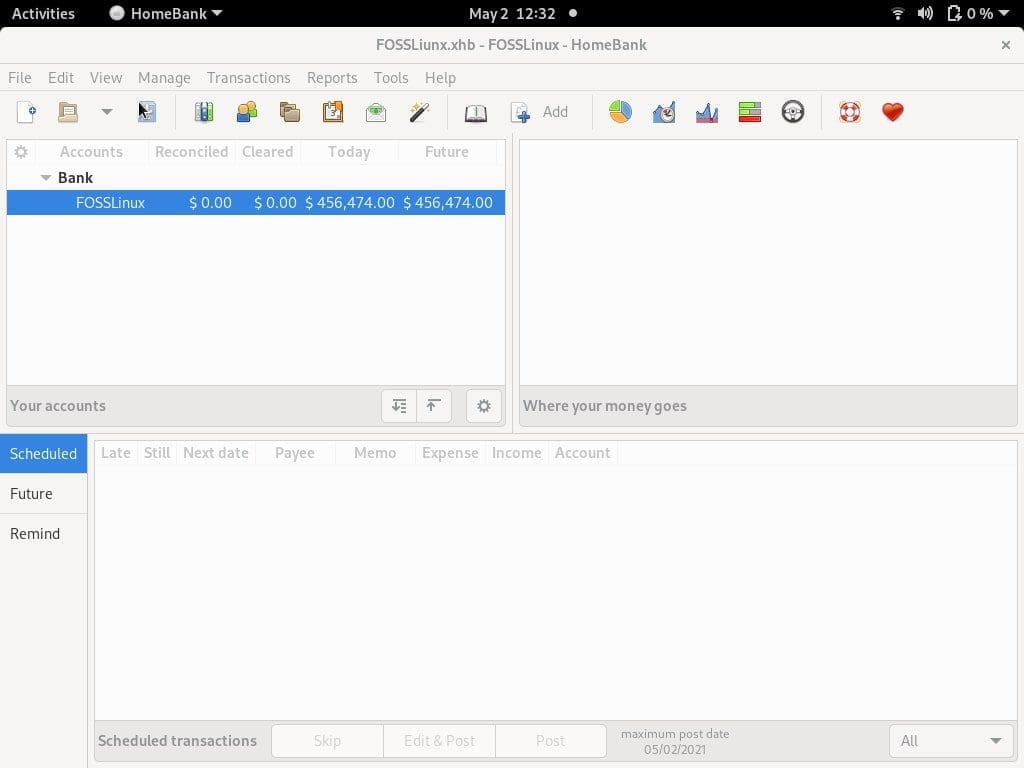
HomeBank Accounting
HomeBank is a compelling open-source personal finance management software. It features an extensive collection of functionality to keep track of your monetary transactions. It features an interactive GTK+ based interface making it straightforward to use. Its simplified interface comes in handy if you get started or have little or no previous accounting experience.
HomeBank runs efficiently on several Linux distros and systems. It supports file formats like QIF, QFX, OFX, and CSV. Dynamic reports, bank, cash, credit card, liability, and asset management. Other features include budget management, scheduled transactions, beautiful charts, and more.
Desirable features
- It supports importing standard financial documents and formats like QIF, QFX, OFX, and CSV.
- It features a simple, elegant GTK2 based user interface.
- Supports multi-accounts, automated transactions.
- It features robust financial analysis and charts.
3: Skrooge
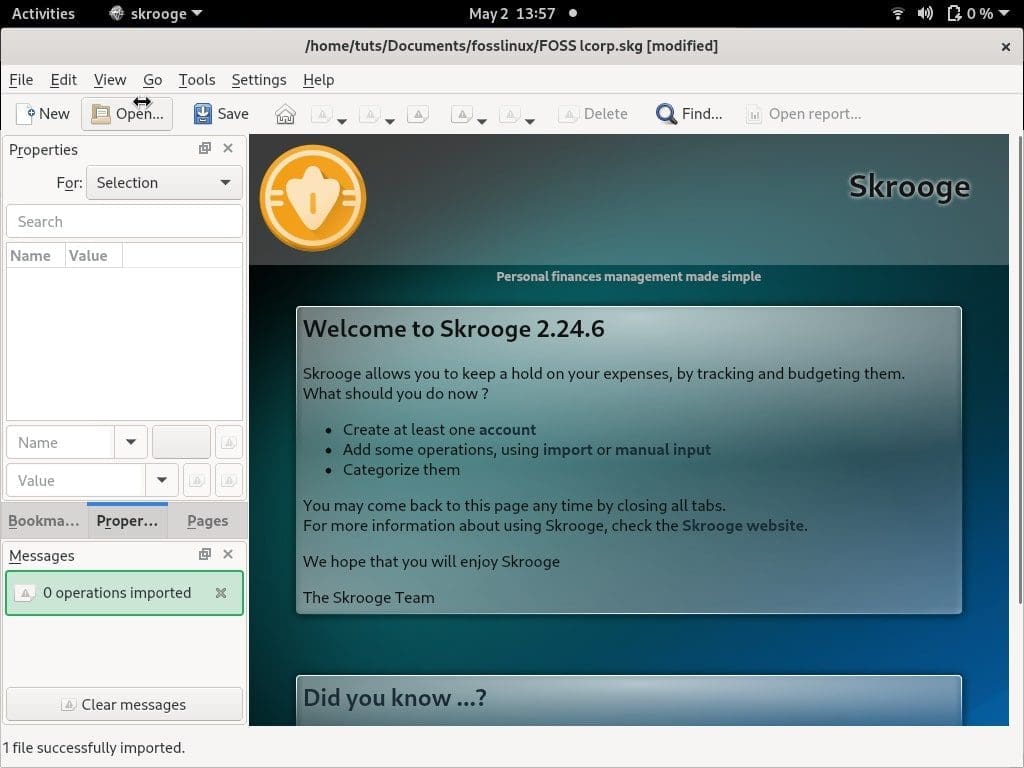
Skrooge Accounting
Skrooge is an excellent KDE-powered software that makes it easy to manage your finances. It can import financial documents from other accounting software like KMYMoney, GNUCash, Microsoft Money, Grisbi, Home Bank, Money Manager Ex, etc. It features periodic report creation, budgeting, support for multiple currencies, and expense tracking.
Desirable features
- It features robust reporting tools to build graphs quickly and analyze income and expenses.
- It implements an effective budget management system.
- You can import financial data from numerous sources such as KMYMoney, GNUCash, Microsoft Money, Grisbi, Home Bank, Money Manager Ex.
- It supports multiple payees and currencies.
It is available for Linux, Windows, FreeBSD, and MAC.
4: Grisbi
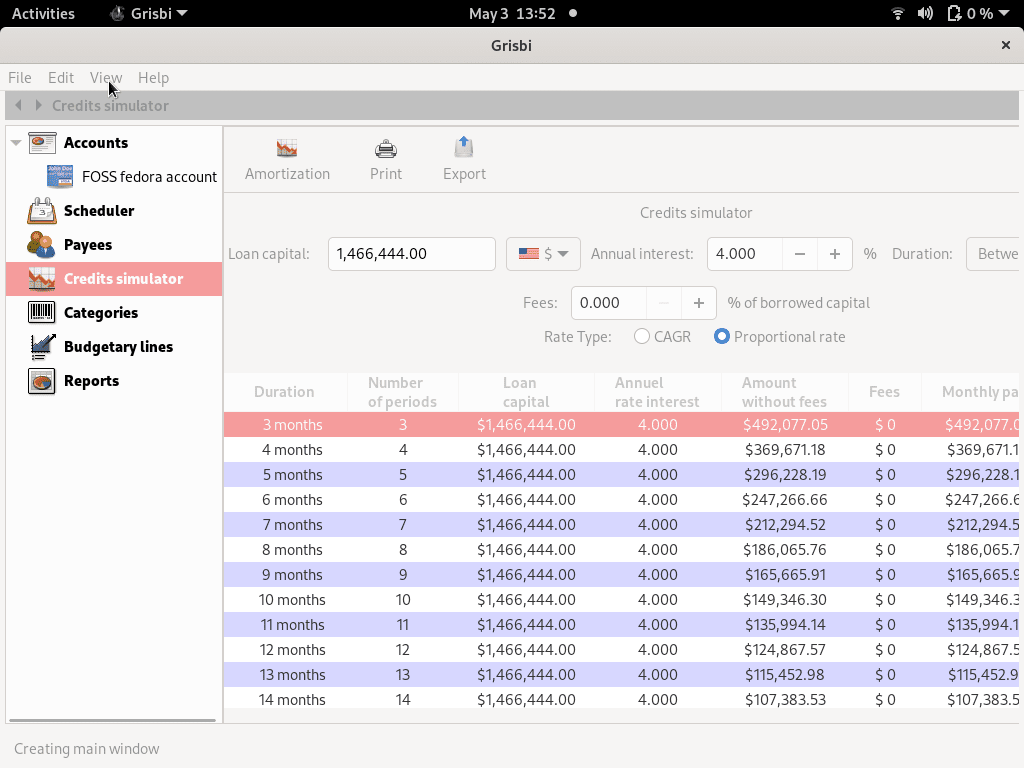
Grisbi Accounting
Grisbi is free, open-source accounting software for Linux systems. It has been under active development for over 21 years, making it an established accounting software. It features robust functionality right out of the box and a simple yet elegant user interface. Grisbi makes it very intuitive to manage users, multiple accounts, multiple currencies. You can easily import financial documents directly from QIF, OFX, and Gnucash.
Desirable features
- It features a simple, straightforward, and intuitive GUI interface.
- You can easily schedule future transactions.
- Users can print financial documents using LaTeX or export them to HTML.
- It is open-source, meaning it can be modified and extended to meet user requirements.
Grisbi gives you a consistent view of transaction lists, tabs, trees and is extensively customizable, making it a good choice for rookies and experts alike. Grisbi 2.0.0 is now available for download and is advertised as ‘Free as in Free beer!’ from the Grisbi home page.
5: SQL-Ledger
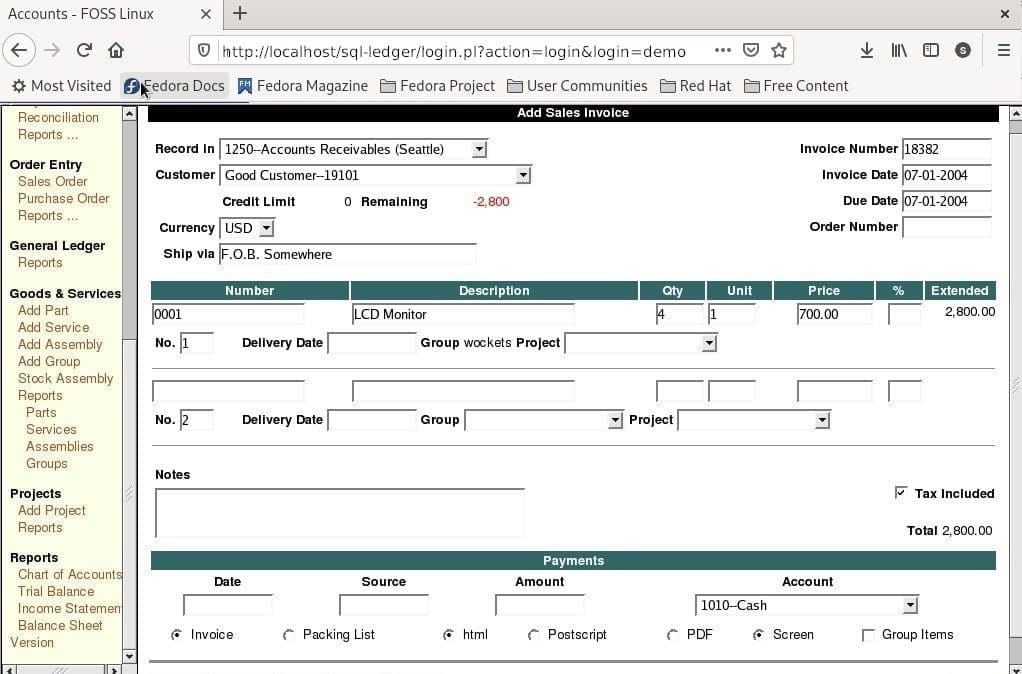
SQL-ledger accounting
SQL-Ledger is a modern web-based accounting software built using easily readable Perl code. It is freely available for Linux, Unix, Mac, and Windows platforms. Installation only takes a few minutes to complete, and adding new languages does not require any special programs.
It features an intuitive interface giving users a minimal learning curve. SQL-Ledger employs a powerful double-entry accounting mechanism that allows users to track financial data without any hassle.
Desirable features
- It uses an SQL database to store data, and you can easily manage and access the data from a web browser.
- You can easily accomplish personal preferences, customization, and database modification from the configuration files.
- Supports CSV file imports and backup.
- Users can make vouchers and general ledgers.
- Support for payroll and Time Cards.
- It features a POS (point of sale) to make and print purchases or sale orders.
- It supports foreign currency and internalization
6: Money Manager Ex
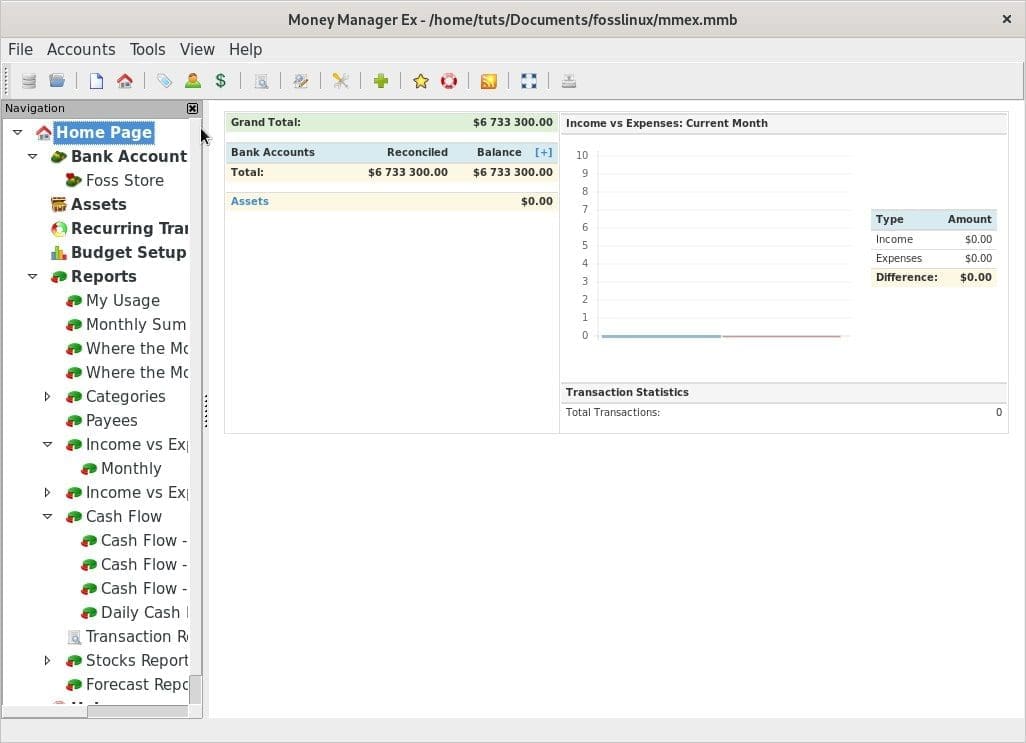
Money Manager Ex Accounting
Money Manager Ex is a powerful, open-source, cross-platform personal finance software. It supports many features that provide users with a bird’ eye view of their finances. It will help you to keep track of when, how, and where the money goes so that you don’t get caught up with an unwanted financial mess.
Money Manager Ex has a powerful reminder system for recurring bills, budgeting, deposits, cash flow, and forecasting. You can import data in CSV format, QIF, and you can quickly generate excellent reports like graphs and pie charts.
Desirable features
- Simple, intuitive one-click report generation.
- Excellent reminders for recurring deposits, expenses, and bills.
- Supports cash flow and budgeting forecasting.
- It features a non-propriety SQLite database that features the AES encryption mechanism for financial data safety.
- Users can run Money Manager Ex directly from a removable USB drive.
- The Money Manager Ex mobile app helps you to keep track of finances on the go.
Money Manager Ex is the perfect choice for users who want powerful yet flexible finance and accounting software.
7: Akaunting
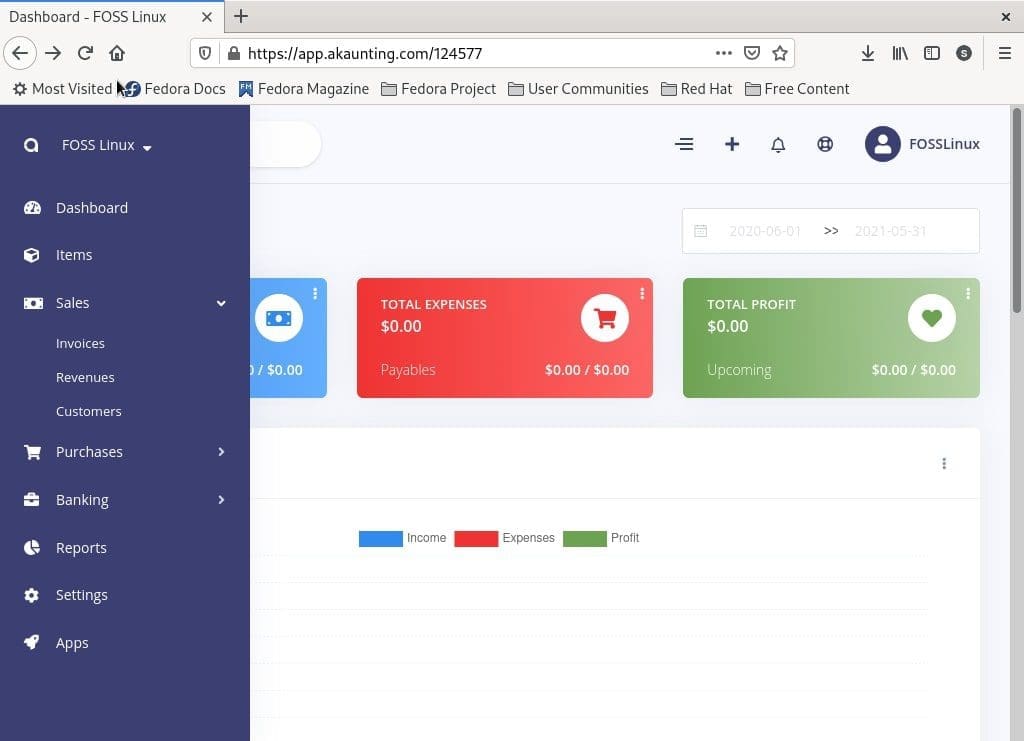
Akaunting software
Akaunting is an open-source accounting application created with Laravel, Bootstrap, API, Swift Mailer, JQuery, etc. Akaunting is a platform that can help you manage all your financials, like sending invoices to clients or receiving payments.
It is free and open-source software that can be installed on your host or accessed on the Akaunting cloud with no setup fee. The cloud platform lets you manage your accounts from anywhere on your Mac, PC, Mobile Phone, etc. It has an easy-to-use interface with a multilingual client & admin panel.
Desirable features
- It is a web-based accounting system that you can access from anywhere in the World.
- Completely free and open source.
- Client portal to manage permissions of different users.
- Supports invoicing, expense tracking, cash flow, and reporting.
- Supports multiple currencies.
- pIt boasts advanced security features for your financial data.
- You can convert reports into PDF documents.
8: Apache OFBiz
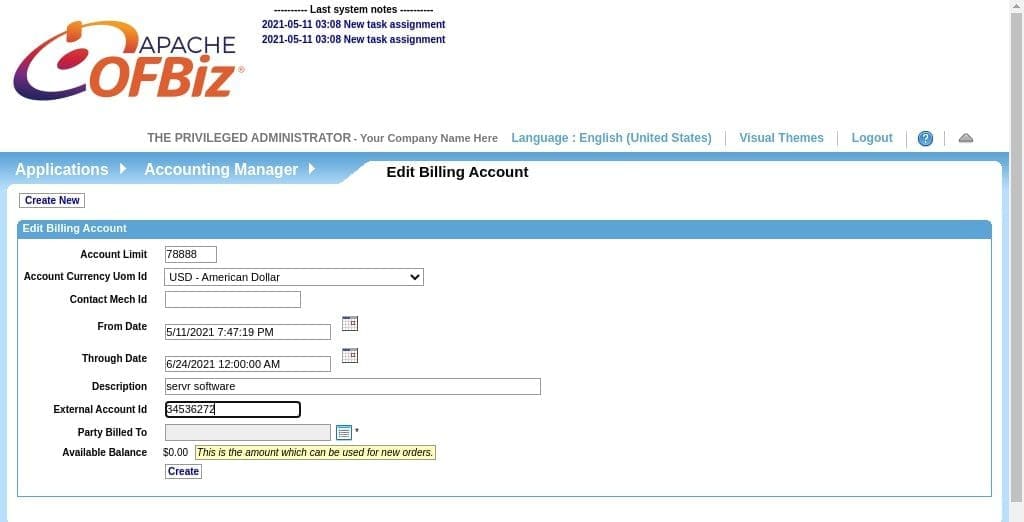
Apache ofbiz ERP
Apache OFBiz is a free, open-source, and cross-platform suite of business applications that offer several modules for advanced enterprise processes. It is a top-level project from Apache Software Foundation. It is a Java-based web framework with a matured engine and a widget-based user interface that allows users to develop applications.
It can handle ERP tasks such as order management, contracts, payments and billings, e-commerce, catalog management, etc. Apache OFBiz features applications and framework components for ERP (Enterprise Resource Planning), SCM (Supply Chain Management), CRM, MRP (Manufacturing Resource Planning), and eBusiness.
OFBiz features numerous accounting tools to manage invoicing, general ledger, vendor management, asset management, order processing, inventory management, catalog management, and automated stock replenishment. It also supports numerous databases such as MySQL, Oracle, Sybase, MS SQL Server, PostgreSQL, and DB2.
Desirable features
- It features a multi-stage production process to resolve resource bottlenecks.
- It features CRM, E-Commerce, WebPOS, and order management modules.
- It is fully customizable and highly scalable accounting software.
- It supports manufacturing and warehouse management.
Moreover, Apache OFBiz will let you manage your online market from inside your accounting software. It is an excellent option for users who specialize in selling products online through Amazon or Aliexpress.
9: KMyMoney
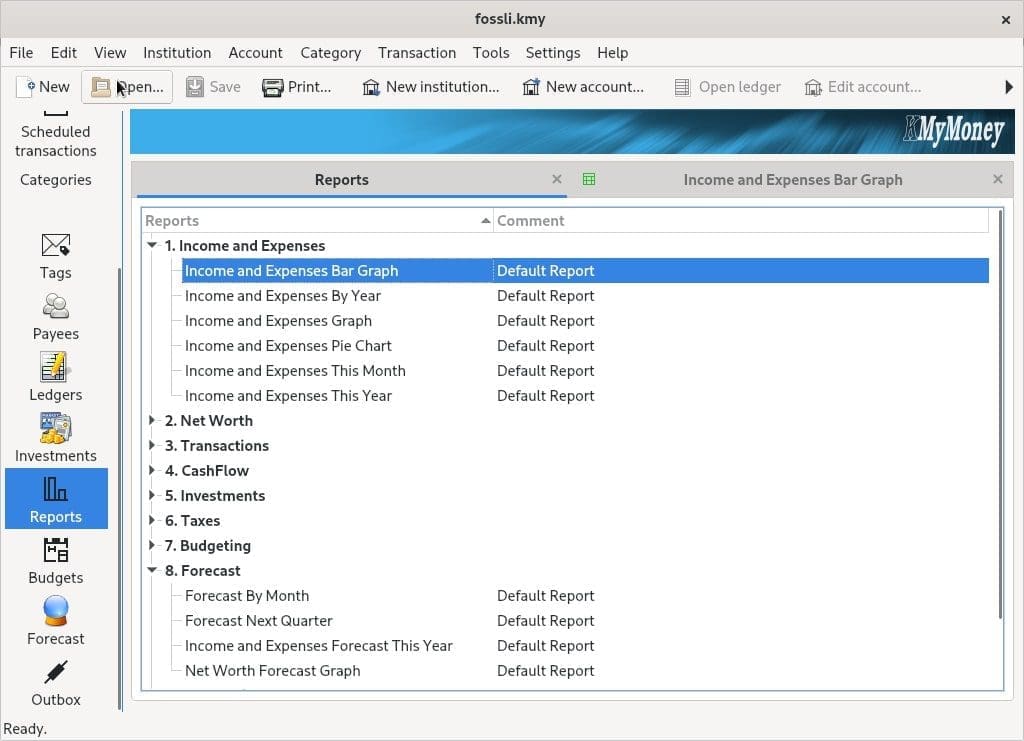
KMyMoney Personal Accounting
KMyMoney is another free and open-source personal finance management tool managed by KDE. You can easily utilize this for managing accounts, transactions, ledgers, and a lot more. It has been developed in C++ programming language and installed on FreeBSD, Mac OS X, Windows, and Linux systems.
Desirable features
- It offers a simple and functional user interface.
- It supports double-entry bookkeeping and different types of accounts.
- You can extend program functionality using plugins.
- It features institution and account management.
- Supports QIF import, reconciliation, scheduling.
- It has advanced features for classification management, investment tracking, and budgeting.
10: LedgerSMB
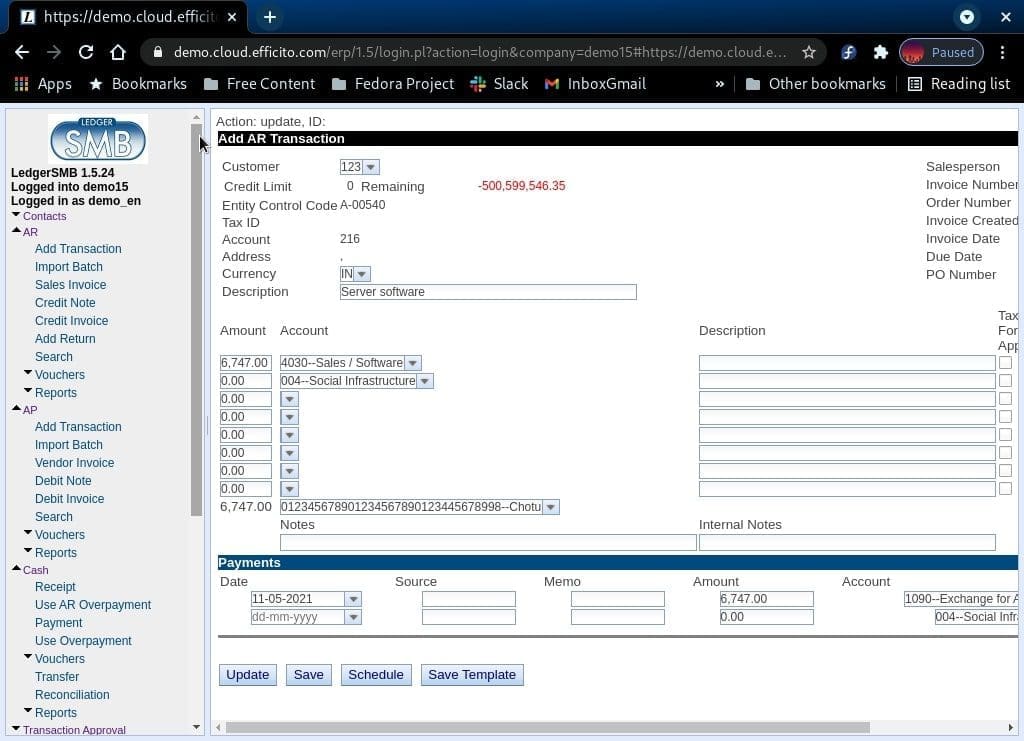
LedgerSMB Accounting
LedgerSMB is open-source accounting software that has been under development since 2006 as a fork of the popular SQL-Ledger project. It aims to create a basis for users to develop their business and manage their financial problems with features like double-entry bookkeeping, data integrity controls. LedgerSMB has quality documentation and vibrant community support.
LedgerSMB makes our list because of its simplified yet powerful approach to solving accounting problems. Its open architecture enables it to integrate with other business applications easily. The architecture allows businesses to build and extend the software around their business processes.
Moreover, LedgerSMB has several built-in modules like sales, invoicing, purchasing, light manufacturing, inventory management, fixed asset tracking, and point-of-sale. It can translate up to 45 languages.
Desirable features
- It features a web-based user-client platform.
- It implements a robust security mechanism to ensure the integrity of its databases.
- The open architecture model allows third-party developers to contribute and extend the project.
- Users can mail invoices and documents from within the application.
- It supports several document output formats like PDF, CSV, HTML, Office formats, etc.
LedgerSMB can be deployed in trade, retail, rental, investment firms, and IT service business ventures.
Recap
There is a robust open-source accounting software out there for you to utilize for whatever business accounting challenges you come across. The list has highlighted some applications that can offer you the opportunity to extend its functionality, solve your accounting needs while saving you some money.
The best way to find software that works for you is to analyze the business you are managing and the core functions you seek to accomplish. For example, software for small or medium-sized businesses might not work well for larger corporations.
Our list is not cast on stone, and suggestions are always welcome.


3 comments
Akaunting is NOT free nor open-source! Once you register, every module you need costs a monthly fee.
@Jose I’m afraid but you’re wrong. Akaunting is GPL-3 licensed and it’s all available at https://github.com/akaunting/akaunting
Why do these sorts of articles miss the excellent Manager.io accounting software? It is fantastic.